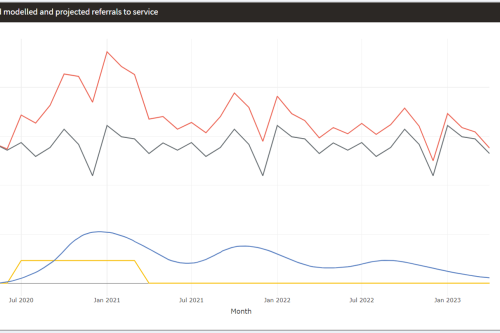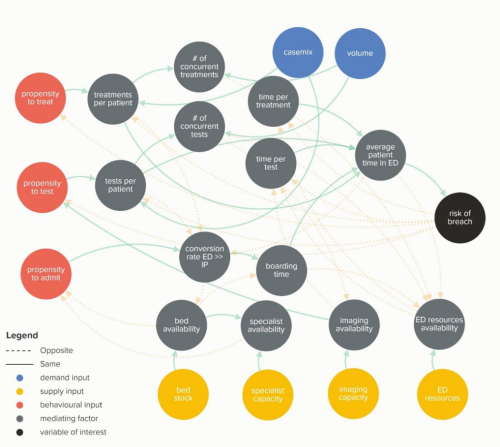 Elective care | Emergency care | Policy
Elective care | Emergency care | Policy
How is growth in diagnostic testing affecting the hospital system?
Diagnostic services, such as medical imaging, endoscopy, and pathology, have grown substantially in recent years and at a faster rate than most other healthcare services. Increased diagnostic testing brings benefits to patients, but rapid growth of this service area within a complex, adaptive…
 Better use of analysis | Inequalities
Better use of analysis | Inequalities
Population health implications of the Covid-19 pandemic
Our new report for The Midlands Decision Support Network (MDSN) presents findings of the effects of the care disruption, from the Covid-19 pandemic, on population health. The in-depth analysis identifies which patients and health conditions should be the focus of future efforts in reducing…
 Mental health | Policy
Mental health | Policy
Estimating the impact of the proposed reforms to the Mental Health Act on the workload of psychiatrists
In January 2021, the Government published a White Paper, setting out its plans to reform the Mental Health Act. The Government invited views on the paper and in July 2021, it published a summary of the consultation responses and its plans to address the issues raised. The proposed reforms aim to…
 Mental health | Primary, community and social care services
Mental health | Primary, community and social care services
Inequities in children and young people’s mental health services
Good mental health during early years and childhood has a great bearing on health throughout life. By contrast, poor mental health can cast a long shadow. Consequences may include depression, self-harm, and poor physical health. Services recognise this. They aim to provide access to support in a…
 Inequalities | Policy | Public health and prevention
Inequalities | Policy | Public health and prevention
Measuring the effect of the coronavirus pandemic on population health
Measuring the effect of the coronavirus pandemic on population health One feature of the pandemic has been the fast-flowing stream of facts and numbers about the impact of Covid-19. At the same time, we’ve had to absorb the meaning of terms that were previously the preserve of epidemiologists and…
 Better use of analysis | Elective care | Emergency care | Inequalities | Primary, community and social care services | Public health and prevention
Better use of analysis | Elective care | Emergency care | Inequalities | Primary, community and social care services | Public health and prevention
Less noise and more light: using criteria-driven analysis to tackle inequalities
Reducing health inequality is a long-standing aim of health policy. Yet the gap between policy aim and population outcome has grown in recent years: on most measures health inequalities have got worse.
 Better use of analysis | Inequalities | Mental health
Better use of analysis | Inequalities | Mental health
Mental Health Surge Model
Early in the Covid pandemic, it became clear that people’s mental health would suffer. Whether through bereavement, unemployment, social isolation, not being able to access support services – or a host of other routes – an alarming picture began to emerge and attract attention.
 End of life | Inequalities
End of life | Inequalities
Health service use in the last two years of life
Health and care services get just one opportunity to support people at the end of their life. When this support is compassionate and appropriate, unnecessary suffering can be avoided and grieving can be eased. When this is not the case, harm and distress can result. The difference in these…
 Inequalities | Mental health
Inequalities | Mental health
Accessibility of perinatal mental health services for women from Ethnic Minority groups
Barriers to accessing mental health care during pregnancy and the first postnatal year (perinatal period) seem to be greater for ethnic minority women.
Modelling the impact of covid on waiting lists for planned care
Working with the national collaboration to coordinate covid-related analysis, and the NHSE/I Midlands region, the Strategy Unit has produced a ‘systems dynamics’ model of waiting lists for planned care. The model is freely available for non-commercial use across the NHS. Here, Steven Wyatt and Mike…
 Emergency care | Policy
Emergency care | Policy
Waiting Times and Attendance Durations at English A&E Departments
In March 2019, NHS England is expected to report the outcome of its review of constitutional waiting times targets. This report reviews the factors that have led to the decline in performance against one of these targets - the 4-hour target for Accident and Emergency Departments. The analysis…
Risk and Reward Sharing for NHS Integrated Care Systems
Risk and reward sharing is a simple and attractive concept, offering a commissioner the opportunity to co-opt and incentivise a provider to moderate growth in healthcare demand by sharing in the savings or cost over-runs. The Centers for Medicare and Medicaid Services (CMS), a US government…
Identifying Potential QIPP Opportunities - Dudley Example
Given the pressures within the NHS, being able to identify opportunities for efficiencies and improvements is vital to inform commissioning intentions. This report is an example of analytical work which to support commissioners. The objective of this report is to provide information to…
 Elective care | Emergency care
Elective care | Emergency care
The Effect of Demographic Change on Acute Hospital Utilisation
Recognising that the effect of population ageing can be overstated, we set out to ask what effect an older population will have on demand for health and care services. Here, we explain why typical approaches ‘overlook the fact that rising life expectancy makes … older people “younger”,…